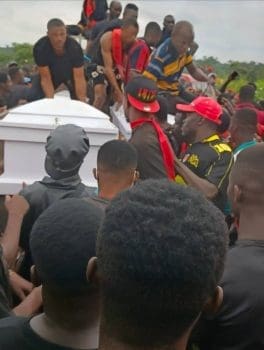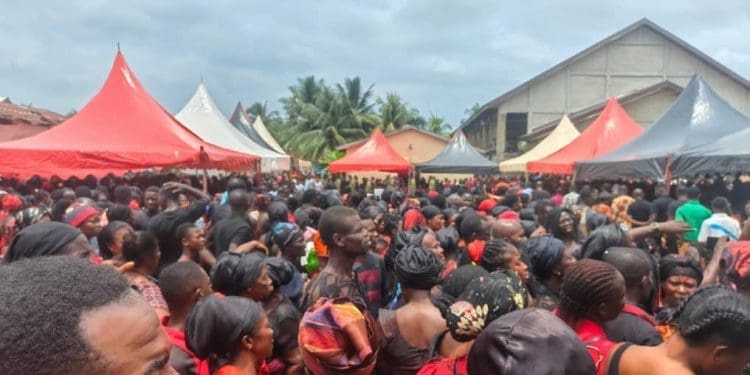The town of Obogu was plunged into deep mourning on Thursday, July 31, 2025, as thousands of grieving residents and sympathisers gathered to bid farewell to 16 young lives lost in a tragic road crash earlier in the week.
From dawn, the streets were awash in red and black traditional colours of mourning as families, friends, and neighbours assembled to honour the memory of the victims.
Businesses closed, movement came to a halt, and the usually vibrant town was enveloped in silence, pierced only by dirges and wailing.
The deceased, all young and vibrant members of the Saviour Church, had been returning from a spiritual retreat in Osiem in the Eastern Region.
The journey, meant to be one of renewal and revival, ended in disaster when their bus collided with a fuel tanker near Juaso, killing 16 and leaving several others injured.
The tragedy sent shockwaves through Obogu, devastating families and shaking the entire community.
In line with Asante customs, those who die under unnatural or tragic circumstances are not brought into town for burial rites.
As a result, the victims’ bodies, preserved at the Stewards Hospital Morgue in Yawkwei, were not returned to Obogu but transported directly to the cemetery, where thousands had already gathered.
The crowd, a cross-section of the community and beyond, relatives, church members, schoolmates, and sympathisers, stood in solemn anticipation as the coffins arrived.

A collective cry of anguish erupted. Mothers fainted in despair. Classmates sobbed inconsolably. Sixteen white-draped caskets, laid side by side, bore painful testimony to lives unfulfilled and futures lost.
Prayers were offered, hymns sung, and pastors sought to offer comfort in the face of unspeakable grief.
“We have lost not just our children, but the very future of this town,” an elder said, his voice breaking with emotion.
As the caskets were slowly lowered into the earth, the wailing grew louder, echoing the depth of pain that had now become part of Obogu’s story.
The sorrow of this tragedy will remain etched in the hearts of its people — a wound not easily healed.













